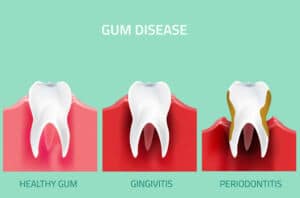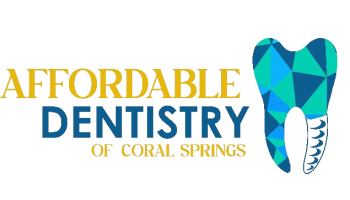{:en}Patients often wonder, why would they require a deep cleaning if a patient initially came in to the office for a regular, basic cleaning.
Here’s the difference and an answer.
A regular cleaning focuses on the surfaces of the teeth and between teeth above the gum line. The teeth also get polished during a regular cleaning. Patients may be regular cleaning candidates when they get a professional cleaning done at least once every six months.
If dentist visit reveals significant pockets that are greater than 4mm, then a patient is at risk or in the stage of periodontal disease. That is when patients are candidates for a deep teeth cleaning. A dentist will highly recommend and suggest a deep teeth cleaning to stop and prevent a progression of a disease.
A deep teeth cleaning also known as Scaling and Root Planing (SRP), which is very different from a regular cleaning. Deep teeth cleaning is needed in order to remove bacteria, calculus (tartar) and debris that collects under the gum line. Calculus over time collects and creates a great safe place for bacteria. At that point it cannot be removed by brushing, flossing or regular teeth cleaning.
Harm from bacteria
Over time Immune system responds to bacteria and causes inflammation trying to fight bacterial infection. If left untreated, the infection and inflammation will continue to progress under the gum line, which will lead to bone lose, loose teeth and eventually the loss of one or more teeth.
Deep teeth cleaning and post procedure
Deep teeth cleaning procedure can be performed on one or two quadrants at a time, or the entire mouth (four quadrants) can be treated in one visit.
During the visit our hygienist will typically numb the area that needs to be treated. Next, the hygienist will carefully work under the gum line to clean away the calculus and debris. After this, the hygienist will carefully shape, or plane, the root of the tooth, to remove places where bacteria could collect in the future.
Recovery from deep teeth cleaning is usually very simple. The dental hygienist will prescribe an antibiotic regimen for the patient to follow. If the patient is experiencing any discomfort or tenderness in the treatment area, our caring hygienist may recommend an over-the-counter pain reliever. Our hygienist will provide patients with after care instructions, and confirm with them when they should be able to resume a regular oral hygiene routine, including regular brushing and flossing.
We will make a post procedure appointment to make sure everything is healing well.
Many patients are curious about their next cleaning. Will they require a deep cleaning forever? The answer is no. Gum disease can be treated and often cured, but may require regular ‘maintenance’ visits, usually every 3 months in the beginning, to monitor the status of your teeth, gums and bone to make sure patients gums have healed and the bacteria has not returned. Some individuals who may be predisposed to having gum disease may need to return for regular periodontal maintenance cleanings, and others may be able to return to a regular hygiene routine and 6-month dental checkup visits.
Call to schedule your teeth cleaning at Affordable Dentistry of Coral Springs same day!
Our dental office will be one pit stop for all your dental needs. We do all types of cleanings, root canal procedures, dental implants, crowns and veneers. {:}{:es}Los pacientes a menudo se preguntan por qué necesitarían una limpieza profunda si un paciente inicialmente llega a la oficina para una limpieza básica regular.
Aquí está la diferencia y una respuesta.
Una limpieza regular se enfoca en las superficies de los dientes y entre los dientes por encima de la línea de las encías. Los dientes también se pulen durante una limpieza regular. Los pacientes pueden ser candidatos habituales a la limpieza cuando se les realiza una limpieza profesional al menos una vez cada seis meses.
Si la visita al dentista revela bolsas importantes de más de 4 mm, entonces el paciente está en riesgo o en la etapa de enfermedad periodontal. Es entonces cuando los pacientes son candidatos a una limpieza dental profunda. Un dentista recomendará y sugerirá una limpieza profunda de los dientes para detener y prevenir la progresión de una enfermedad.
Una limpieza dental profunda también conocida como raspado y alisado de raíces (SRP), que es muy diferente a una limpieza regular. Se necesita una limpieza profunda de los dientes para eliminar las bacterias, el sarro y los residuos que se acumulan debajo de la línea de las encías. El cálculo con el tiempo se acumula y crea un gran lugar seguro para las bacterias. En ese momento, no se puede quitar con el cepillo, el hilo dental o la limpieza dental regular.
Daño por bacterias
Con el tiempo, el sistema inmunológico responde a las bacterias y causa inflamación al tratar de combatir la infección bacteriana. Si no se trata, la infección y la inflamación continuarán progresando debajo de la línea de las encías, lo que provocará la pérdida de hueso, dientes sueltos y, finalmente, la pérdida de uno o más dientes.
Limpieza de dientes profunda y procedimiento posterior
El procedimiento de limpieza profunda de los dientes se puede realizar en uno o dos cuadrantes a la vez, o se puede tratar toda la boca (cuatro cuadrantes) en una visita.
Durante la visita, nuestro higienista normalmente adormecerá el área que necesita ser tratada. A continuación, el higienista trabajará con cuidado debajo de la línea de las encías para limpiar el cálculo y los residuos. Después de esto, el higienista modelará o cepillará cuidadosamente la raíz del diente, para eliminar los lugares donde las bacterias podrían acumularse en el futuro.
La recuperación de una limpieza profunda de los dientes suele ser muy sencilla. El higienista dental prescribirá un régimen de antibióticos para que lo siga el paciente. Si el paciente experimenta alguna molestia o sensibilidad en el área de tratamiento, nuestro higienista atento puede recomendarle un analgésico de venta libre. Nuestro higienista proporcionará a los pacientes instrucciones posteriores al cuidado y les confirmará cuándo deberían poder reanudar una rutina de higiene bucal habitual, incluidos el cepillado y el uso del hilo dental habituales.
Haremos una cita posterior al procedimiento para asegurarnos de que todo esté sanando bien.
Muchos pacientes sienten curiosidad por su próxima limpieza. ¿Necesitarán una limpieza profunda para siempre? La respuesta es no. La enfermedad de las encías se puede tratar y, a menudo, curar, pero puede requerir visitas regulares de ‘mantenimiento’, generalmente cada 3 meses al principio, para monitorear el estado de sus dientes, encías y huesos y asegurarse de que las encías de los pacientes se hayan curado y las bacterias no hayan regresado. . Algunas personas que pueden estar predispuestas a tener enfermedad de las encías pueden necesitar regresar para limpiezas de mantenimiento periodontal regulares, y otras pueden regresar a una rutina de higiene regular y visitas de chequeo dental de 6 meses.
¡Llame para programar su limpieza dental en Affordable Dentistry of Coral Springs el mismo día!
Nuestro consultorio dental será una parada en para todas sus necesidades dentales. Realizamos todo tipo de limpiezas, procedimientos de endodoncia, implantes dentales, coronas y carillas.{:}
para todas sus necesidades dentales. Realizamos todo tipo de limpiezas, procedimientos de endodoncia, implantes dentales, coronas y carillas.{:}










